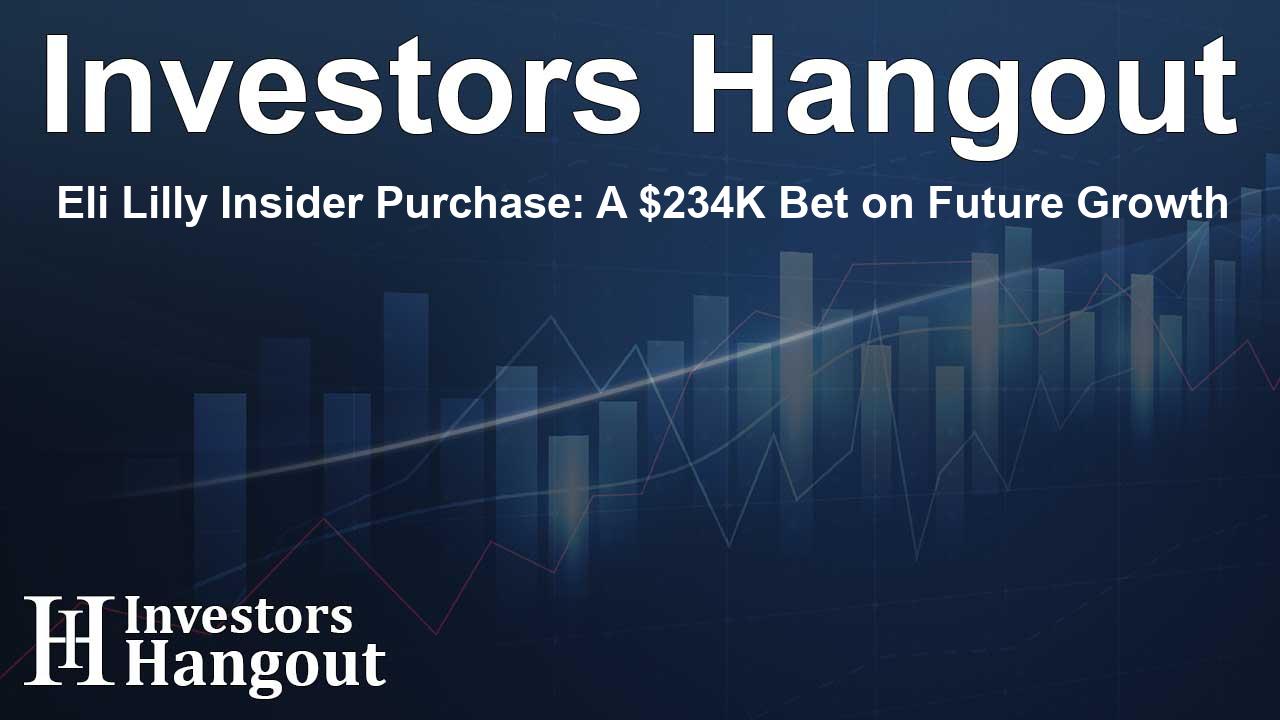Eli Lilly Insider Purchase: A $234K Bet on Future Growth

Eli Lilly Insider Purchase: A $234K Bet on Future Growth
In recent disclosures, it came to light that Juan R Luciano, a Board Member at Eli Lilly (NYSE: LLY), made a significant insider purchase amounting to $234,833. This transaction involved acquiring 322 shares, as detailed in a recent filing with the U.S. Securities and Exchange Commission.
As Eli Lilly's stock is currently trading around $741.66, which reflects a 1.56% decline, Luciano's investment certainly suggests a strong belief in the company's future performance.
Getting to Know Eli Lilly
Eli Lilly is a renowned pharmaceutical company specializing in various fields, including neuroscience, cardiometabolic disorders, oncology, and immunology. Among its notable products are Verzenio, aimed at treating cancer, and a range of drugs targeting cardiometabolic issues like Mounjaro, Zepbound, Jardiance, Trulicity, Humalog, and Humulin, along with immunology treatments such as Taltz and Olumiant.
A Look at Eli Lilly's Financial Performance
Revenue Growth: Eli Lilly has encountered dynamic growth, showcasing a robust revenue increase of 20.43% over the past three months. This impressive upturn underscores the firm’s ability to achieve significant top-line growth, surpassing the average growth rates prevalent within the healthcare sector.
Evaluating Profitability:
-
Gross Margin: The company's gross margin stands at 81.02%, demonstrating exceptional cost management and profitability that outshines many competitors in the industry.
-
Earnings per Share (EPS): However, the current EPS of 1.08 falls below the average for the sector, indicating challenges in net income generation.
Debt Management Insights: Eli Lilly's debt-to-equity ratio is notable at 2.19, signifying a heavier dependence on debt which may raise some concerns regarding financial leverage.
Valuation Metrics Overview:
-
Price to Earnings (P/E) Ratio: With a P/E ratio of 81.19, investors should exercise caution, as the stock may be perceived as overvalued.
-
Price to Sales (P/S) Ratio: Similarly, a P/S ratio of 16.67 might indicate overvaluation, especially when considering revenue streams.
-
EV/EBITDA Ratio: At 59.36, this high figure reveals substantial market recognition of Eli Lilly’s valuation, further reinforcing its prominent position compared to industry counterparts.
Market Capitalization Analysis: Eli Lilly boasts a considerable market capitalization, illustrating its substantial size and widespread acknowledgment in the market.
The Importance of Insider Transactions
Insider transactions frequently offer valuable insights into a company's prospects. Generally, insiders include officers, directors, or any entity owning more than ten percent of a firm's equity. They are required to disclose their trades within a swift two-day timeframe via Form 4 filings.
When an insider like Luciano makes a purchase, it often signals a confidence that the stock's value will appreciate. In contrast, insider sales can arise for various reasons and may not always suggest a declining outlook.
Understanding Insider Transaction Codes
Investors analyzing these transactions often pay particular attention to open market activities detailed in the Form 4 filings. Within this context, a P indicates a purchase, while S denotes a sale. Codes C and A signify the conversion of an option and the acquisition of securities from the company, respectively.
Frequently Asked Questions
What was the recent insider transaction by Juan R Luciano?
Juan R Luciano purchased 322 shares of Eli Lilly for a total value of $234,833.
What does it mean when an insider buys shares?
Insider purchases often indicate confidence in the company's future performance, suggesting that the individual believes the stock price will rise.
How has Eli Lilly performed financially recently?
Eli Lilly reported a revenue growth rate of 20.43% over the last three months, highlighting strong business momentum.
What are Eli Lilly's main therapeutic areas?
The company focuses on neuroscience, cardiometabolic disorders, cancer treatments, and immunology.
What does the high debt-to-equity ratio imply?
A higher debt-to-equity ratio may indicate that the company relies heavily on borrowed funds, which can raise potential risks regarding financial stability.
About Investors Hangout
Investors Hangout is a leading online stock forum for financial discussion and learning, offering a wide range of free tools and resources. It draws in traders of all levels, who exchange market knowledge, investigate trading tactics, and keep an eye on industry developments in real time. Featuring financial articles, stock message boards, quotes, charts, company profiles, and live news updates. Through cooperative learning and a wealth of informational resources, it helps users from novices creating their first portfolios to experts honing their techniques. Join Investors Hangout today: https://investorshangout.com/
Disclaimer: The content of this article is solely for general informational purposes only; it does not represent legal, financial, or investment advice. Investors Hangout does not offer financial advice; the author is not a licensed financial advisor. Consult a qualified advisor before making any financial or investment decisions based on this article. The author's interpretation of publicly available data shapes the opinions presented here; as a result, they should not be taken as advice to purchase, sell, or hold any securities mentioned or any other investments. The author does not guarantee the accuracy, completeness, or timeliness of any material, providing it "as is." Information and market conditions may change; past performance is not indicative of future outcomes. If any of the material offered here is inaccurate, please contact us for corrections.